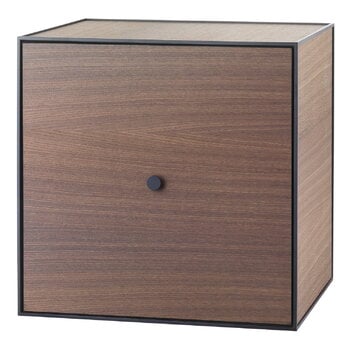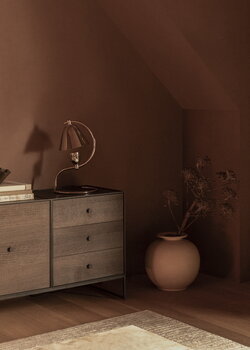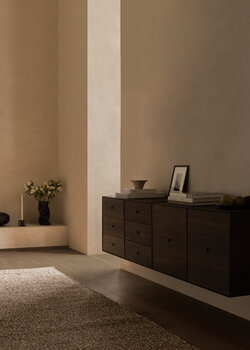Audo Copenhagen’s Frame is a functional and versatile shelving system based on the sketches of the renowned Danish architect Mogens Lassen from 1943. Consisting of square-shaped boxes in black frames, the Frame modules can be mounted on the wall or placed on their own on a table or floor. The parts of the Frame collection are manufactured in Denmark and available in many different sizes and colours. Use your imagination and create your own Frame shelving system according to your needs: the options are endless!
Frame 49 box with door, smoked oak
Audo Copenhagen
Description
Audo Copenhagen’s Frame is a functional and versatile shelving system based on the sketches of the renowned Danish architect Mogens Lassen from 1943. Consisting of square-shaped boxes in black frames, the Frame modules can be mounted on the wall or placed on their own on a table or floor. The parts of the Frame collection are manufactured in Denmark and available in many different sizes and colours. Use your imagination and create your own Frame shelving system according to your needs: the options are endless!
Product details (6)
- Colour
- Smoked oak
- Width
- 49 cm
- Depth
- 42 cm
- Height
- 49 cm
- Frame material
- Lacquered steel
- Main material
- Veneer, MDF
- Product ID
Designer
The Danish architect Mogens Lassen (1901-1987) was a pioneer of Danish functionalism. In 1927 he left to work for an engineering company, but he did not enjoy the work nor speak French. Paris however changed Lassen’s view on architecture and when he returned to Denmark he established his own studio.
Along with working in architecture Lassen also designed furniture and other objects, and his Kubus candlestick has become an icon of Danish design. Lassen started designing the first Kubus long before it was first produced in 1962 - the Kubus candlesticks were not put on the market, and Lassen gave them to family members and friends. The grandchildren and grand-grandchildren of Lassen established the design company By Lassen in 2008 to honor the work of Mogens Lassen and his brother Flemming Lassen.
View all productsReviews (0)
Sustainability
The Product Sustainability Framework, our criteria of sustainable design, helps you find the most sustainable products in our selection. Read below which sustainability criteria this product has met.
Working conditions & labour 7/9
-
Equal opportunities for all employees
-
Commitment to UN Global Compact, fair compensation for all employees
-
Corporate responsibility requirements defined and communicated for suppliers
-
Systematic work for improved inclusion and well-being in the workplace
-
Transparent supply chain
-
Suppliers' compliance to a code of conduct ensured
-
Compliance to the UN Guiding Principles on Business and Human Rights ensured in the supply chain
-
Direct suppliers audited and certified
-
Support for community involvement in the supply chain
Eco-friendly production 8/9
-
Fair and resource-wise water-use in production
-
No incineration or landfilling of returned items
-
No use of endangered species as materials
-
No direct environmental emissions or waste (excl. GHGs) from production
-
The sustainability of direct suppliers' production is addressed and monitored
-
Production and material sourcing that respect biodiversity, animal rights, and natural ecosystems
-
Material-efficient and ecological packaging
-
No potentially harmful chemicals used in own production
-
Positive impact on nature’s well-being through operations that regenerate natural ecosystems
Climate impact 4/8
-
Company's direct greenhouse gas emissions identified and commitment to reduction
-
Product's carbon impact identified and commitment to reduction
-
Guidance on energy- and eco-efficient use of the product
-
Carbon footprint of the product calculated and goals set to reduce it
-
Contribution to climate initiatives beyond the brand’s direct operations
-
Low-carbon or compensated transportation
-
100 % renewable energy in own production and operations
-
Carbon neutral or carbon negative product
Sustainable materials 6/6
-
Sustainable and long-lasting material choices
-
No harmful or hazardous substances
-
Responsible raw material sourcing and production
-
Materials suited for circularity: monomaterials, recyclable finishings, renewable or recycled contents etc.
-
Ecological materials: natural, biodegradable, recyclable or recycled contents
-
Outstanding materials in terms of innovativeness, responsibility, sustainability and circularity: local production or sourcing, 100 % recycled content, C2C-certification etc.
Circular design 4/5
-
High aesthetic quality promoting long-term use of the product
-
Technically durable product design and material choices
-
Design for enduring life-long quality
-
Design and support for product maintenance, repair and upgradability
-
Innovative circular design solutions: circular service system, resale platform, remanufacturing, collection of used products, etc.








